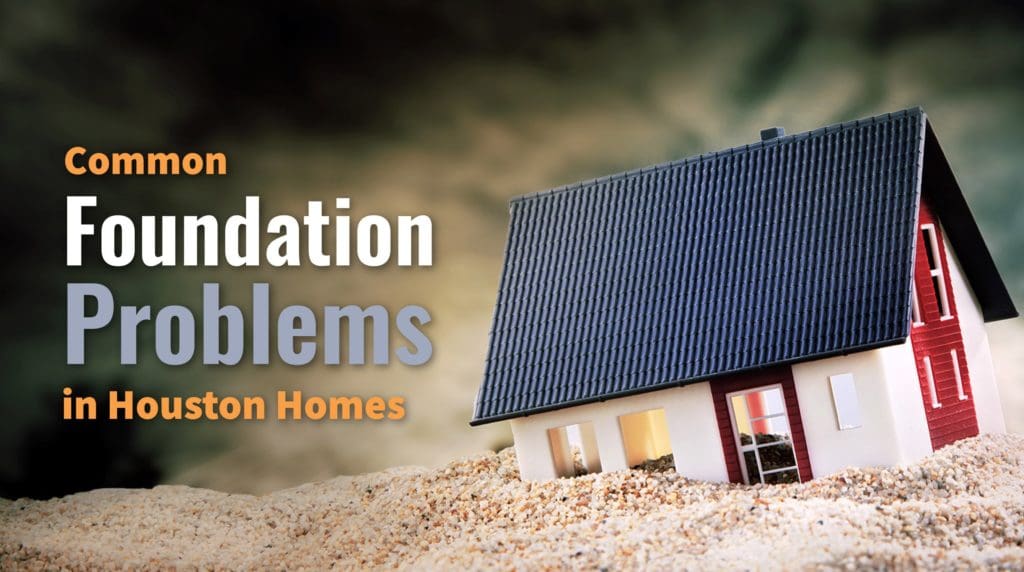Most Houston homeowners are no strangers to foundation problems. No matter where you live in Houston, your home is probably built on clay soil, which is one of the worst soil types for construction particularly due to its tendency to shift as it moistens and cracks as it dries. When it comes to your Houston home’s foundation, these properties can spell disaster. Now, let’s take a look at some of the most common problems Houston homeowners face with their foundations.
Shifting and Cracking Caused by Heaving
In the Houston-Galveston area, heaving occurs mostly during the wet season when the clay soil beneath the home is more prone to absorb water rapidly and expand. That happens because the clay particles this type of soil contains can retain large quantities of water, which may prevent the ground underneath your home from draining as effectively as sandy and rocky soils. But heaving can also occur during winter when the temperature drops below freezing—which is something that rarely happens in Houston. However, if water gets trapped in the soil around or underneath your foundation, low temperatures could cause it to freeze. Because water expands as it turns into ice, it can push the soil, causing it to expand. Excessive soil expansion almost always leads to heaving, which tends to occur particularly towards the outer edge of foundations.
In addition to forcing your home out of its level position—a situation referred to as differential settlement—heaving can exert unequal pressure on the underside of your foundation, especially around its edges and joints. This excess pressure may cause cracks to develop in the foundation and slab, which may break off corners and/or work their way inward towards the center area of the foundation.
Cracking Caused by Shrinkage
As hard as the wet season can be on your foundation, a dry spell can be just as damaging. When clay soil loses too much water, it starts to contract and retract from concrete structures, which may leave empty spaces around and beneath your foundation. This sudden lack of support could cause cracking in your foundation, especially when the clay soil dries out at different rates across the length of your house. In addition to the voids that may occur due to soil shrinkage, gaps could form when the soil gets washed away by heavy rain, flooding, or plumbing leaks. Each time that happens, new pockets may appear beneath your foundation, with the possibility of causing a variety of issues in the future.
Seepage and Your Houston Home Foundation
Once the first cracks appear in your foundation, things will likely continue to get worse with time. What might have begun as a few tiny spider-web cracks in one corner of your foundation can grow into a massive problem as soon as water starts to seep inside. Eventually, you will find that the cracks in your foundation are notably wider than before, and moisture is coming in along your walls and through your flooring.
Settling and Your Houston Home’s Foundation
Even under the best circumstances, it is normal for a home to settle over time. When a house is built, the weight is distributed evenly across the foundation. But as soil expands, contracts, and erodes at different rates, there will inevitably be places where the ground under the foundation succumbs to the weight on top and compacts itself.
Engineers know to plan for settling in advance, but even they cannot predict exactly what will happen. In some cases, the so-called normal settling turns into differential settlement, which is a major foundation problem. Once that happens, you will likely discover a series of telltale signs, including large cracks in your foundation, diagonal cracks in your exterior walls, sloping or uneven floors, tiles detached from the slab, and doors and windows that start to jam.
Ultimately, most foundation problems in Houston originate with water around and underneath homes. While you may not be able to prevent major shifts in weather patterns, you can take some steps to manage the soil around your home so it won’t react so drastically to water and temperature variations. This is best accomplished by installing a foundation watering system that will keep the soil around your foundation adequately moist throughout the year. As this will prevent the soil from absorbing large amounts of water during the wet season and then rapidly drying out during the dry season, there is a lower probability that foundation cracks and voids will develop.
If you’ve recently seen any signs of foundation problems around your house, it is best to call Allied Foundation right away. Minor foundation damage, like small cracks and voids, can be treated in a few hours. Conversely, if you leave a foundation issue unaddressed for too long, you could be facing irreparable damage to your foundation, floors, walls, and even the rest of your home.

